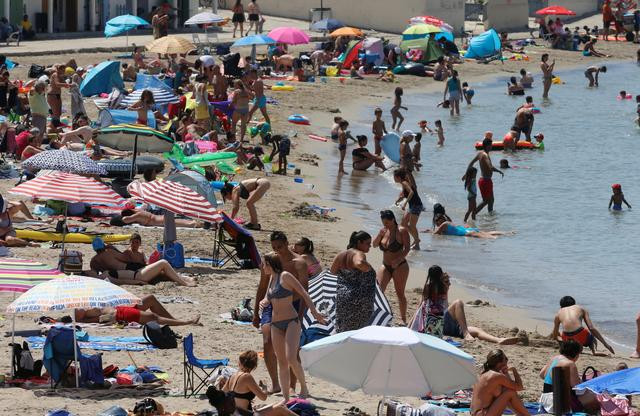 Ukraine reports 5,276 new COVID-19 cases
Ukraine reports 5,276 new COVID-19 cases
 Zelensky: Every third Ukrainian considers road construction one of greatest achievements of 2021
Zelensky: Every third Ukrainian considers road construction one of greatest achievements of 2021
 Ukraine ready to implement Minsk agreements, but Russia's desire needed - Yermak
Ukraine ready to implement Minsk agreements, but Russia's desire needed - Yermak
 Michel: EU unanimously agree to roll over economic sanctions against Russia
Michel: EU unanimously agree to roll over economic sanctions against Russia
 Actions by Ukraine's partners will help prevent worst-case scenario - Zelensky
Actions by Ukraine's partners will help prevent worst-case scenario - Zelensky
 COVID-19 in Ukraine: Health officials confirm 8,899 daily cases as of Dec 17
COVID-19 in Ukraine: Health officials confirm 8,899 daily cases as of Dec 17
 Macron tells Zelensky he declared support for Ukraine in call with Putin
Macron tells Zelensky he declared support for Ukraine in call with Putin
 Zelensky, Scholz discuss gas transit through Ukraine after 2024
Zelensky, Scholz discuss gas transit through Ukraine after 2024
 Ukraine ready for any format of talks with Russia - Zelensky
Ukraine ready for any format of talks with Russia - Zelensky
 Ukraine’s only journalist in Russia facing extremism charges - lawyer
Ukraine’s only journalist in Russia facing extremism charges - lawyer
 PM Shmyhal: First two applications for investment projects worth $96 million filed
PM Shmyhal: First two applications for investment projects worth $96 million filed
 Zelensky, PM of Italy discuss security situation around Ukraine
Zelensky, PM of Italy discuss security situation around Ukraine
 President signs off State Budget 2022
President signs off State Budget 2022
 London considering all options for responding to Russia's aggression against Ukraine
London considering all options for responding to Russia's aggression against Ukraine
 Putin, Biden to hold another round of talks
Putin, Biden to hold another round of talks
 Some 260,000 Ukrainians “victims of human trafficking” over 30 years - prosecutor general
Some 260,000 Ukrainians “victims of human trafficking” over 30 years - prosecutor general
 Ukraine plans to create center to protect energy infrastructure from cyber attacks
Ukraine plans to create center to protect energy infrastructure from cyber attacks
 No clear idea so far when Normandy Four top diplomats set to meet - German Ambassador
No clear idea so far when Normandy Four top diplomats set to meet - German Ambassador
 Ukraine receives EUR 600M in macro-financial assistance from EU
Ukraine receives EUR 600M in macro-financial assistance from EU
 Zelensky holds phone conversation with PM of Israel
Zelensky holds phone conversation with PM of Israel
 Ukraine sets new daily COVID vaccination record
Ukraine sets new daily COVID vaccination record
 MFA: European Union has not yet removed Ukraine from list of safe countries
MFA: European Union has not yet removed Ukraine from list of safe countries
 Kyiv records 1,023 new COVID-19 cases, 29 deaths
Kyiv records 1,023 new COVID-19 cases, 29 deaths
 G7 ambassadors welcome adoption of law on NABU status
G7 ambassadors welcome adoption of law on NABU status
 Ukraine can increase Covid vaccination rates to 1.5M a week – Liashko
Ukraine can increase Covid vaccination rates to 1.5M a week – Liashko
France registered its highest temperature since records began on Friday as the death toll rose from a heatwave suffocating much of Europe.
The mercury hit 45.9 degrees Celsius (114.6 Fahrenheit) in Gallargues-le-Montueux, in the southern Provence region, weather forecaster Meteo France said, nearly two degrees above the previous high of 44.1 Celsius recorded in August 2003.
Twelve towns in southern France saw new all-time highs on Friday and three experienced temperatures above 45 degrees, it said.
The World Meteorological Organization said 2019 was on track to be among the world’s hottest years, and that 2015-2019 would then be the hottest five-year period on record.
It said the European heatwave was “absolutely consistent” with extremes linked to the impact of greenhouse gas emissions.
Four administrative departments in France were placed on red alert, signaling temperatures of “dangerous intensity” that are more typical of Saudi Arabia.
The unusually high temperatures are forecast to last until early next week.
In Spain, where temperature peaked above 43 degrees for the second day running, wildfires raged across 60 sq km (23 sq miles) of land in the northeastern Tarragona province. Officials said firefighters battling the blazes on 20 fronts managed to avoid them from spreading.
In the central region, a fire broke out on the outskirts of Toledo, forcing the evacuation of two public buildings, a regional official told Reuters.
To the north in Valladolid, a man of 93 collapsed and died due to the heat, police said. And in a small town outside Cordoba, a 17-year-old died of heat-related effects after jumping into a swimming pool to cool off.
Since 1975, Spain has registered nine heatwaves in June, including five in the last decade, according to the Spanish meteorological office.
In France, one boy was seriously hurt when he was thrown back by a jet of water from a fire hydrant. Some 4,000 schools were either closed or running a limited service to help working parents unable to stay at home.
State-run rail operator SNCF offered free cancellations or exchanges on long-distance trips, social workers helped homeless people cope with the heat, and French families with elderly relatives who were ill or living alone were advised to call or visit them twice a day and take them to cool places.
The greater Paris region, Ile de France, has banned more than half of cars from its roads as the stifling heat worsened air pollution, the toughest restriction provided for — although all cars were to be allowed to leave the city as school holidays began.
The cities of Lyon, Strasbourg and Marseille have also restricted traffic.












































































































































